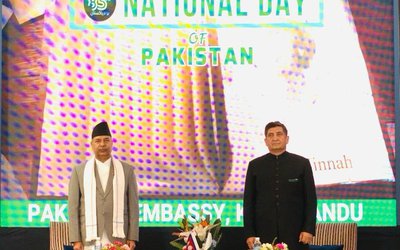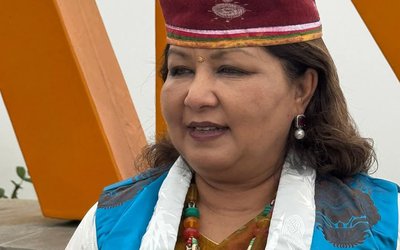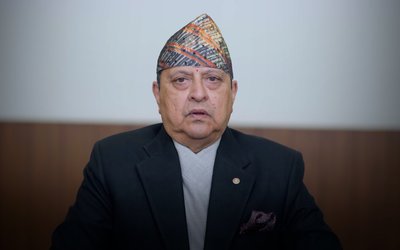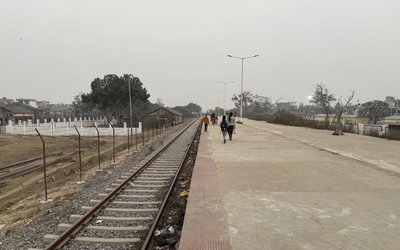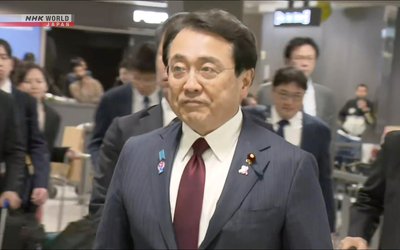
Professor Dr. Surya Subedi, a noted Nepalese legal scholar based at Leeds, UK, emphasized recently the importance of research based approach to legal education in Kathmandu recently.
Speaking at a seminar organized by Kathmandu University School of Law (KUSL) in association with Alliance for Social Dialogue (ASD) and Nepal Constitution Foundation (NCF), Professor Subedi appreciated the effort of the Kathmandu University to establish a quality legal education system at KUSL. In addition, he also spoke about the issue of establishing a think tank on constitutional and policy matters and the challenges pertaining to its incorporation under the university patronage.
The discussion was attended by members of the KUSL Steering Committee, founding Registrar of Kathmandu University, faculty members, law advocates and staff members from NCF. Following a welcome note by Dr Bipin Adhikari, the Coordinator of School of Law Steering Committee, the program was initiated through Dr. Subedi’s presentation on the “prospects and challenges” of forming a Law School at Kathmandu University and the establishment of a think tank under the University's banner. Subsequently, a discussion was held with the members involved raising concerns and seeking Dr Subedi’s expertise. The discussion was facilitated by Dr Surya Dhungel, representinting KUSL Planning Advisory Committee.
Dr. Subedi initiated stressing the importance of creating competent legal experts in Nepal citing a dearth of internationally qualified legal practitioners in the country. In addition, Dr. Subedi stressed the need to establish a research based approach to education. Citing the scenario prevalent in UK, Dr. Subedi highlighted the emphasis put on research based orientation for students from GCSE level (Equivalent to SLC/+2 level in Nepal). Furthermore, Dr. Subedi highlighted the challenges pertaining to Asian students mainly Nepali, Indian, Chinese and Arab etc due to lack of emphasis provided on research based education culture. According to him, research based orientation is imperative in legal education, not only because it provides law students with impetus to write adequate opinions but it also enhances comprehensive reports writing tools and develops critical analysis skills.
In addition, Dr Subedi promoted the idea of establishing a research intensive law school that caters to international standards and produces internationally competent graduates. Secondly, Dr. Subedi advocated for focus on specialization programs rather than generalized courses. Citing the rising demand for specialized experts, Dr. Subedi emphasized the necessity to create research oriented specialized experts.
In terms of seeking international affiliation, Dr. Subedi highlighted the important criteria the university must meet in order to garner international recognition. Speaking from his personal experiences from the University of Leeds, Dr. Subedi highlighted three main criteria that are essential in acquiring affiliations: 1. The faculty of the University: (What are the qualifications of the faculty members) 2. The standing of the University: (What sort of research output does the University produce) 3. The physical facilities provided by the University: (Infrastructure, management systems, teaching capacity etc). Further, Dr. Subedi added that, in terms of Law schools, library is another aspect that demonstrates the stature of its facilities.
In terms of International recognition, Dr. Subedi stressed the need to systemize the research output produced within the country conforming to international standards. In terms of publications, Dr. Subedi stressed the need to confirm through ISSN and ISBN serial numbers to provide an international record and systemized access medium for its distribution to create an international standing for Nepali legal experts. In addition, Dr. Subedi encouraged the KUSL faculty members to approach and seek affiliation from Asian Law Institute (Singapore, 2003) which associates with the best Law School faculties around the Asian continent. In addition, Dr. Subedi urged the Steering Committee to facilitate events organized through the Institute in the country along with research affiliations with reputable universities around the world. Also, Dr. Subedi assured the Steering Committee that he would be exploring all the avenues within University of Leeds and other universities around the UK to provide any kind of assistance to KUSL.
In terms of establishing a think tank under the KU banner, Dr. Subedi acknowledging the lack of adequate think tanks in Nepal commended the proposal. In addition, Dr. Subedi outlined the model created by BIIS (Bangladesh Institute of International Strategy) where the salary structure for staff members is substantially better than provided by the government. In addition, they require the staff to be full time researchers at the institute and maintain a politically neutral stance. A retired Army General sits as a counselor of the think tank to keep an eye on the proceedings and prevent from the leakage of valuable government information. Moreover, the institute provides policy advice regardless of the different political upheaval in power regimes. Dr. Subedi then went on to stress the uphill task to the Steering Committee in establishing a politically neutral think tank in light of the heavy politicization demonstrated in every aspect of Nepali culture.
Following Dr. Subedi's presentation, a discussion was held with the members involved raising concerns and seeking Dr Subedi’s expertise. Mr. Daman Dhungana acknowledged the onerous task taken by the Steering Committee in establishing a school of law at KU. Seeking Dr. Subedi's help in receiving goodwill and any other form of assistance, he promoted the credibility of the people in charge and stressed the right steps taken in order to create a holistic legal education centre matching national and , in the future, international standards.
Dr. Sitaram Adhikary, founding registrar of KU, stressing the challenges inherent in establishing a school of law at KU mentioned the role of credible faculty in undertaking the task with guaranteed success. In addition, Dr. Adhikary stessed the importance of the incubation period of the university in creating a proper legacy for quality legal education. According to him, KU must strive to be a trend setter from the onset in order to garner top students as well as faculty in order to ensure the long term prosperity of the University.
Ganesh Datta Bhatta, Associate Professor NLC, highlighted the scope available for people in Nepal encouraged to work in legal field. In addition, he stressed the need to provide quality education as opposed to the quantitative approach prevalent here. In terms of think tank, he highlighted the need for an independent, neutral and research oriented institution. Moreover, he highlighted commitment and the notion of nationality as important ingredients in the long term success of KUSL and its associate think tank.
Niranjan Acharya, Legal Advisor of KU, raised concerns as to the approaches to self sustainability that the university should pursue. In light of KUSL's debut, he highlighted the need to attract top quality students and provide adequate facilities to the staff members and the students. Moreover, Acharya requested Dr. Subedi's expertise on the aspects the university needs to focus in order to acquire self sustainability, much akin to the other faculties within KU.
B.P. Bhandari, NCF, citing international trends highlighted the dearth of internationally competent legal experts in Nepal in instance pertaining to arbitration, international negotiations etc. In addition, stressing Singapore's development through focus on education, Bhandari advocated for a promotion of a quality education mechanism to produce able manpower in the future. In addition, Chetan Acharya, NCF, inquired about the prospect of acquiring international recognition and the attributes inherent in garnering such feat.
Responding to the issues raised, Dr. Subedi stressed the need to provide research oriented impetus to legal education to garner international competence. Such competence, according to him, would enable the university to attract top students from foreign countries in the future, thus, contributing to the self-sustainability of the university. In terms of acquiring international recognition, Dr. Subedi stressed the need to seek international affiliation in agencies such as the Asian Institute of Law. In addition, Dr.Subedi stressed the need to produce internationally competent research output through qualified faculty to attract international interest and top students, hence, increasing the reputation of the university worldwide.
Dr Surya Dhungel who facilitated the discussion said that the KUSL will continue to interact with other leading professors in the future as well. He also thanked the speaker for his time and contribution to the discussion programme.
- NEPAL-THAILAND: Joint Business Council
- Apr 13, 2025
- BIMSTEC SUMMIT: Nepal’s Stand
- Apr 11, 2025
- IME GROUP: Expands Into Paper Industry
- Mar 24, 2025
- CPN UML: Instigated By India
- Mar 23, 2025
- ADB’S CHIEF ECONOMIST: Nepal Reduces Poverty
- Mar 11, 2025


